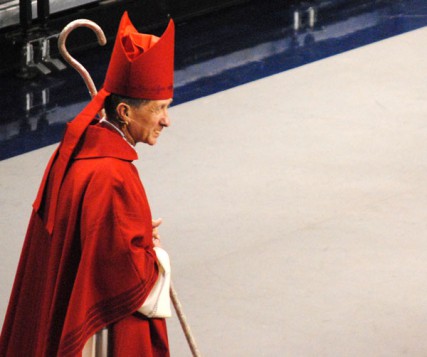
On Tuesday Bishop Blase Cupich, of the Catholic Diocese of Spokane, sent his third letter to parishioners, urging them to vote no on Referendum 74, and reminding them of the Catholic teachings on marriage and family.
The purpose of his letters, he said in a recent SpokaneFAVS interview, is to serve as a guide for those in the Catholic community who are discussing the state’s same-sex marriage legislation with friends, family and co-workers.
“I wanted to put something out there prior to the vote,” he said, adding that people are nervous to talk about the issue of gay marriage and are often “unnecessarily offensive.”
Cupich said the conversations should be thoughtful and sensitive and wrote, “When addressing issues of depth and passion — indeed most importantly at such times — we should be committed to the proposition that our public dialogue must be marked by civility and clarity, and that it should generate light rather than heat.”
“I’m bringing 40 years of experience as a pastor and I’ve ministered to people who have same-sex attractions,” he said. “I know people living with this and the challenges they have and I think it’s important for people to know their bishop has friends who are gay and lesbian and I know their heartaches.”
But he said in his most recent letter, “Believing in Marriage,” that Referendum 74 isn’t about being sympathetic, it’s about being faithful to the Bible’s teachings on marriage.
He said as bishop, he feels “obligated” to talk about the legislation and, “trusts people will make the right decision. I don’t do the politicking, I do the preaching.”
In his Aug. 14 letter, “Some Reflections on Referendum 74” he said there are numerous reasons Catholics should vote against the legislation, including the argument that the law simply redefines marriage and does not give same-sex couples any new legal rights which they do not already have under the domestic partnership provision.
“This is not about equal rights, it’s about identity,” he said.
He also said that marriage is about teaching gender roles.
“Men and women are not interchangeable. They each bring something of their difference to complement each other. In a marriage union, a mutual sharing of each other’s difference creates life, but it also nourishes that life in a family where sons and daughters learn about gender from the way it is lived by their mothers and fathers. Thoughtful consideration should be given to the significant consequences such unhinging will mean for children, families, society and the common good.”
He said if the state allows same-sex couples to wed, he can’t help but wonder what’s next.
“But even now, some questions come to mind and should be asked: If marriage is only about relationships, why limit unions to two people? Why does the new law include the traditional prohibition of close kinship unions for both opposite and same sex couples? The threat of genetic disorders in children is not an issue for same sex couples. Is it not reasonable to assume that a closely related same sex couple will in time successfully challenge this prohibition as an unreasonable imposition? If so, would not the state be forced to return to the present situation of special laws recognizing the unique identity of opposite sex unions?”
And, he said, marriage is about advancing the human race — something same-sex couples are physically unable to do.
“The sexual unions of same-sex couples do not generate a child and that’s important to keep that in mind here,” Cupich said, adding that bringing children into the earth is a “very noble task.”
The Washington State Catholic Conference echoed this with its Aug. 30 letter, “Marriage and the Good of Society,” which reads, “ By separating marriage from procreation and the responsibility of men and women to raise children that result from their sexual union, the new marriage law would abandon the state’s principal interest in this time-honored institution. If the state successfully disconnects marriage from the potential inherent to sexual union between a man and woman, the civil meaning of marriage will be lost, and the institution that results will be a genderless contract without reference to children. The foundational nature of marriage for the good and the strength of human society will be harmed beyond repair. Faithful, monogamous marriages between one man and one woman will cease to be the legally-established social standard for uniting children with their parents, even though social science has established that children do best when raised in homes with married mothers and fathers.”
Cupich said heterosexual couples who are unable to produce can still “bear witness” to a loving, healthy marriage.
He said he realizes many Catholics don’t follow the church’s teachings on contraception, but said he’s still called to teach.
“It doesn’t stop me from doing my job,” he said.
Monsignor Robert Siler, chief of staff and chancellor for Yakima diocese, said Catholic churches in Washington plan to amp up their teachings on marriage this month.
“The Catholic Church … plans to up its teachings on marriage and on our understanding that marriage is a covenant between a man and a woman based on natural law, the scriptures and our traditions,” he said.






